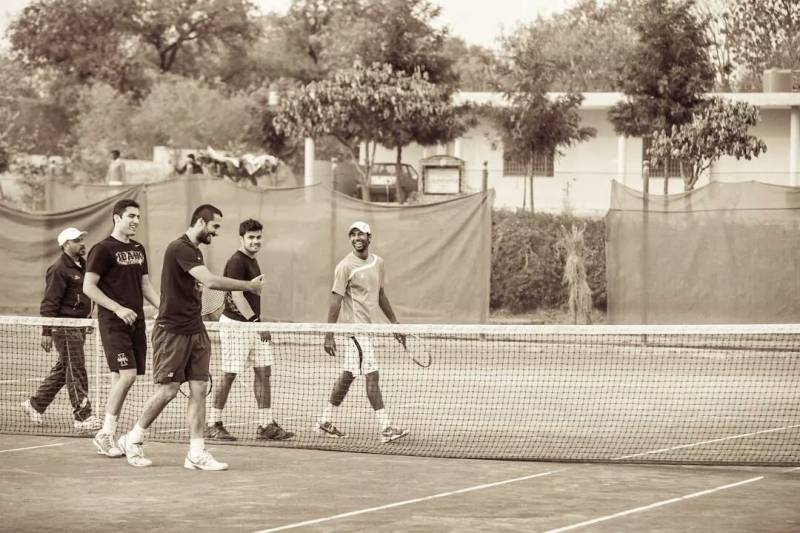Thousands of teenagers and 20-year-olds have decided to make tennis their profession, their career. It's glorious to think of yourself as a professional athlete. When you look at Roger Federer, Novak Djokovic, Gael Monfils and the likes of them, and see the standing ovations they get after those gruelling exchanges and the miraculous passing shots. It's very exciting to think that you'll be in their position one day.
Playing on Arthur Ashe under lights at New York city prime time with more than 22,000 watching in the stands, including some movie stars and celebrities and millions watching on TV! To be honest, the majority of the crowd will be more excited to spot the celebrity in the crowd than watching you grind point after point from six feet behind the baseline.
I was there at the opening night of US open this year. Djokovic was playing an unknown. An unknown who was top 70 in the world – top 70. No one knew who he was then – still nobody knows. That guy was playing under lights at Arthur Ashe on opening night. A dream come true. But it wasn't because of him that he was playing there. Nobody came to watch him. No one cared. The tournament director didn't put him on center; he put Djokovic there. He was lucky to be drawn with Djokovic and extremely unlucky at the same time.
To the world, he was a nobody that night, and still is. He looked average on the court, and at 5' 7" he seemed to be far from a world class athlete. Ask me or the hundreds of thousands of other tennis players worldwide, the answer will be totally different.
We would kill to be in his place at 61st in the world and be playing on opening night at the U.S. Open, no matter if it's because of us or the opponent. To us, the guy is an amazing tennis player who would knock us off the court. Who is so successful that he is among only the top 128 special, extraordinary tennis players playing in a slam out of tens of thousands grinding out there in training academies away from home.
Only we can imagine how much hard work and lifelong sacrifices went into him getting there; and not just his, his coaches' and fitness trainers' throughout the years and of course his family. Coaches, trainers, hard work, academies, etc all these things can be arranged or developed, but one thing that is a necessity, without which you cannot become a tennis player, no matter how good you are, is family support. More than morale or emotional support, it's the financial support, without which a player cannot play, unfortunately.
You have to pay to become a tennis player. You have to spend heaps of money and from a very young age until you make it. You actually still keep spending when you make it, but by then you're making some money too so you can afford it. I don't want to get into the minute details but these are just a few things to give an idea.
An academy in Vienna, Austria costs $3,500 a month, living and food another $1,500. Let's say another $1,000 for travel to pro tournaments where you have to pay for your coach's travel and stay.
When you invest money, you expect a return, immediate or in the long run. In pro tennis you don't just invest your money, you invest your life. That's all you are doing, 24/7. It's your profession and your profession empties your pockets for many years.
A lot of credit goes to parents around the world for supporting their children's dreams. Very expensive dreams too, that mostly don't come true.
If I was a businessman and had a lot of money to invest, a tennis player wouldn't be the last thing on my list. It would never even be on it.
Professional tennis players might be the worst investment from a business and logical standpoint. There is no return. The amount of money it takes to make a tennis player is too high. The amount of money a tennis player makes is a joke. If you win a futures tournament, you make around $1,200. If you go to Turkey to play from outside of Europe, let's say from Pakistan, it costs close to $1,000 for flights and $75 a night for room and food. Already more than what one can possibly make. It makes no sense.
This is what I don't understand. Does everyone really think they can make it to the top 100 and stay there for many years? Because that is the only way there is any chance that you will break even on your life's investment. You have to play the majors, the Master's tournaments to collect big checks otherwise you live on a tight budget – unless you're Ernests Gulbis.
So, it beats me why there are so many good tennis players out there. So many guys training at expensive academies, not going to school, putting their minds and bodies through such tests. It's not easy, it's not glamorous. You're a nobody. The world doesn't know you until you're top 40. Even us, the tennis players, don't pay any attention to guys outside the top 20. It's lonely. You have a coach sometimes and may be some friends but no mother, no father, no sister, no brother, for months.
I salute their commitment and their ambition, their endless struggle and devotion.
May be it's for the money, or perhaps for the fame. Who knows, it might just be for the love of the game.
Abid Akbar is a former Under-18 national champion, a scholar-athlete at the university of Idaho, the assistant coach of his alma mater's tennis program and currently a professional tennis player






